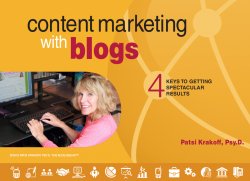 How is blogging and online content marketing like psychotherapy?
How is blogging and online content marketing like psychotherapy?
One of the things I like about blog writing and publishing content on the Web is the connection to people. While “real life” connections put you face-to-face with people you know, publishing content on the web connects you distantly with people you don’t know.
You get a chance to poke the brains of strangers within a certain niche. The only thing that makes your readers similar may be their interest in the niche you are writing about, because you solve problems they have, because you share interests and passions with them.
And yet, in our mammalian brains, we all react to similar things, even when we’re brought up in different cultures across the globe. There are similar persuasion triggers, similar drives, similar emotional hot buttons.
Although I no longer work as a psychotherapist, I apply psychology and knowledge about the brain and human responses to everything I do and write. Let me share some thoughts I had this week about how people respond when they read online.
In the brain, emotions are closely linked to action. In our mammalian past, they were the single most important function of our brains. Our survival depended on quick action. If we had to think first, we’d be some tiger’s lunch before we decided where to jump.
Feelings do not require reflection or thought. We feel, we act. We think later and justify our actions based on input from our more highly advanced reasoning brain.
Strong feelings are hot-wired into the brain’s action centers, provoking any one of the “F” actions:
- Feeding
- Fleeing
- Fighting
- Fornicating
Emotions are simple and clear so that action is easy and fast. We wouldn’t be here talking about content marketing if our ancestors hadn’t become good at all four “F” actions, especially the last one.
How does this translate to Web usage?
Maybe online our brains now react differently to emotions? Let’s look at how instantaneous emotional responses show up as we read Web pages, email promotions, and blogs, shall we?
You’re reading the NY Times online, there’s a picture of food accompanying an article about food prices. Instead of reading, you go get a snack. When you come back, you’ve forgotten what you were reading and start searching again for what you needed to know.
You get an email promotion, with a curious subject line, you open and read to find it was misleading and not what you were expecting. You’re pissed off because you wasted time with it. So instead of actually fighting, you argue or write snarky responses or leave negative comments on their blog.
In the web version of “fleeing,” you delete, unsubscribe, flag as spam, and shut off email and the Web altogether. But long before you get to that point, your mind may wander and ‘flee’ from a site out of boredom or confusion. Click and bye-bye.
I’m not going on to the next “F” word, you get the picture of what I’m trying to describe here.
If you’re trying to build a business using Web pages, blogs, and email marketing, you need to think about these four automatic brain reactions.
Keep in mind that our five senses are processing 11 million pieces of info per second. Of these only 40 enter our conscious awareness. The brain is constantly filtering and sorting information that we need to pay attention to. And the filter goes like this:
- Is this something I can consume to make me feel good?
- Is this dangerous and do I need to flee or avoid this?
- Is this an enemy that I need to fight or defend myself against?
- Is this something I can bond with or make a source of pleasure?
Try to keep in mind readers’ are constantly filtering subconsciously. Your content needs to grab readers’ attention and hold it long enough to get people to trust you and take a desired action.
Why do you think GoDaddy uses pictures of racing star Danica Patrick on their site to sell domain names? Filter this question through these four questions and you’ll come up with four good reasons!














Recent Comments